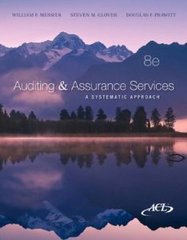Answered step by step
Verified Expert Solution
Question
1 Approved Answer
Consider the following information for Maynor Company, which uses a perpetual inventory system: Transaction Units Unit Cost Total Cost January 1 Beginning Inventory 18 $
| Consider the following information for Maynor Company, which uses a perpetual inventory system: |
| Transaction | Units | Unit Cost | Total Cost | ||||||
| January 1 | Beginning Inventory | 18 | $ | 68 | $ | 1,224 | |||
| March 28 | Purchase | 28 | 74 | 2,072 | |||||
| August 22 | Purchase | 36 | 78 | 2,808 | |||||
| October 14 | Purchase | 41 | 84 | 3,444 | |||||
| Goods Available for Sale | 123 | $ | 9,548 | ||||||
The company sold 41 units on May 1 and 36 units on October 28.

Step by Step Solution
There are 3 Steps involved in it
Step: 1

Get Instant Access to Expert-Tailored Solutions
See step-by-step solutions with expert insights and AI powered tools for academic success
Step: 2

Step: 3

Ace Your Homework with AI
Get the answers you need in no time with our AI-driven, step-by-step assistance
Get Started


